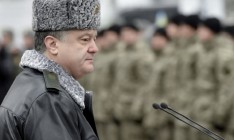Economy
External debtIMF has softened fiscal demands, but tightened monetary requirements instead

The International Monetary Fund approved the allocation of the second tranche in the amount of US $1.39 bn to Ukraine within the framework of the stand-by arrangement approved at the end of April in the total amount of US $17.1 bn. The second tranche was scheduled for July 25 and was transferred at the time when, according to the original arrangements, Kyiv would have been expecting the third one. The fund explains that the delay was due to problems with implementation of the guidelines at the end of May and July. «Generally speaking, the terms of the program have been carried out as planned,» said Deputy Director of the IMF European Department Poul Thomsen.
However, The Cabinet of Minister headed by Premier Arseniy Yatsenyuk insisted on softening of the fiscal and monetary conditions of the arrangement. The fund agreed to such a proposal, but the coordination of new criteria was delayed. As a result, the schedule of the loan shifted. Based on the IMF’s report on the results of the first audit of the program and the memorandum submitted by Ukrainian authorities to Washington (both documents are in possession of Capital), in the event of successful implementation of the updated requirements Kyiv will receive the third and fourth tranches of the loan in the amount of US $2.78 bn, combined upon the request of the government on December 15.
This, however, may not be the latest revision of the terms and the schedule of the arrangement. Everything will depend on the development of the armed conflict in the east of Ukraine, which was the main reason for the decline of the national economy and the government’s failure to fulfill the initial terms of the program. «We believe that the conflict will diminish in the coming months,» says Thomsen. «If this prediction does not come true, we will be forced to revise certain elements of the program’s strategy and its viability may depend on more assistance from international partners of Ukraine».
Aggravation of risks
The IMF emphasizes on the two biggest challenges that the Ukrainian economy currently faces — development of the conflict in Donbas and the escalation of the dispute between Kyiv and Moscow on gas prices. In this respect, experts of the IMF have revised their economic forecasts for Ukraine. While in April they expected a decline of the Ukrainian economy in 2014 by 5%, the current rate is 6.5%. They also forecast that the unemployment rate will grow from 8.5% to 10%. In other words, every tenth Ukrainian will be unemployed by the end of the year. For comparison, in 2013 the figure was 7.2%, while the current level was not registered even at the peak of the crisis in 2009. For those who will retain their jobs, the average wage, taking into account a 19% rate of inflation, will decrease by 5.7% by the end of the year (the previously expected rate was 3.3%). This will mean a decrease in consumption by 4.5% compared to the previous figure of 3.7%. The mere fact that due to devaluation Ukrainians and national enterprises reduced demand for imports much more (by 21.4% for the goods) than was expected (13.8%) will constrain the economy from falling into deeper recession.
New guidelines
Given the aggravated risks and lower forecasts, the IMF made concessions to the Cabinet of Ministers and increased the allowable deficit of the consolidated budget of central and local authorities, the Pension Fund and other social funds from 5.2% of GDP to 5.8% of the GDP, or by UAH 10.5 bn to UAH 88 bn. Furthermore, taking into account the budget hole of Naftogaz of Ukraine, the budget deficit was increased from 8.5% of the GDP to 10.1% of the GDP or by UAH 25.4 bn to UAH 153.3 bn.
Yet the IMF made concessions not in all fiscal matters. It remained adamant on the issue of striping agrarians of their benefits for the value added tax. As a result, the government promised to draft a reform of the VAT regulations for farmers and adjust them to the standard regulations for other branches of industry by the end of September. The farmers will have to work in compliance with the new rules starting from 2015.
Limited flexibility
It is not possible to speak about easing the monetary criteria of the IMF for certain. On the one hand, it reduced the requirements for international reserves. By next year the NBU is obligated to accumulate US $16.2 bn in gold and currency reserves instead of US $19.2 bn. The fund claims this is a way of relieving pressure on the hryvnia exchange rate. The IMF predicts that the rate should be 12.5 UAH/USD by the end of the year, not 10.5 UAH/USD, as it was planned in April, particularly that Ukraine’s for foreign exchange reserves decreased due to the decline in imports. The new minimum of reserves will cover 2.5 months of imports, while the previous covered almost the same period — 2.6 months.
But, on the other hand, ceding in one matter the fund tightened another — namely, the monetary policy of the NBU. «In light of recommendations of the staff (IMF — Capital) to put an end to moral pressure on banks and limit the NBU’s ability to impose sanctions (including revoking of licenses), the NBU has agreed that administrative measures should be gradually phased out at the pace comparable to macroeconomic and financial stability,» says the report of the fund. This particularly concerns restrictions on purchase of foreign currency by individuals, withdrawal of foreign currency deposits and rules requiring banks to transfer hryvnia funds to separate accounts a few days prior to the purchase of foreign currency at clients’ request. Now the regulator is working on the corresponding plan. It was also stated in the memorandum that Kyiv will «resist changes in legislation aimed at strengthening the NBU’s capacity to impose sanctions on foreign exchange and money markets».
In addition, the IMF has introduced requirements for the regulator’s currency interventions on the interbank market. Despite the weakening of the hryvnia, officials in Washington made the NBU promise to purchase a minimum of US $1 bn on the interbank market by the end of the year to fill its reserves. The NBU will also strictly limit the sale of currency to Naftogaz and the government and will not sell currency to local authorities, which will buy it on the open market. Moreover, according to the agreements with the IMF, the Ministry of Finance should try to negotiate with its creditors revision of internal government bonds denominated in foreign currency by offering new interest rates and maturities.






 of the agreement of syndication with Financial Times Limited are strictly prohibited. Use of materials which refers to France-Presse, Reuters, Interfax-Ukraine, Ukrainian News, UNIAN agencies is strictly prohibited. Materials marked
of the agreement of syndication with Financial Times Limited are strictly prohibited. Use of materials which refers to France-Presse, Reuters, Interfax-Ukraine, Ukrainian News, UNIAN agencies is strictly prohibited. Materials marked  are published as advertisements.
are published as advertisements.